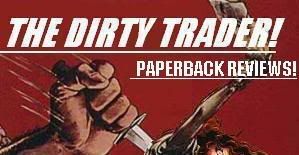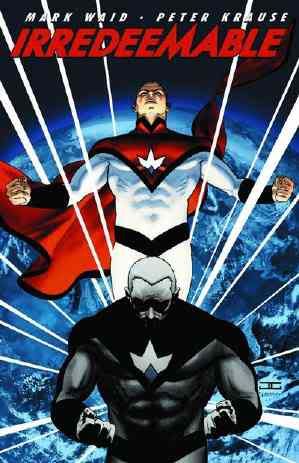

In his afterward, Grant Morrison calls Mark Waid's Irredeemable Volume 1 "brilliant, hard-edged, progressive super-hero comics. There's no trace of nostalgia... it rides the zeitgeist..." The two page piece is full of such accolades.
I'd like to take this opportunity to note that Morrison also thinks his scripts physically manifest on the material plane, and he's taken an awful lot of drugs in his time.
Over a decade ago, Morrison offered similar praise for Waid's work on The Flash, seeing it as a harbinger for the end of the 1980s deconstructionist wave in comics and the beginning of a new era of optimism and revitalization. However, aside from his successful return of JLA to its Silver Age roots, comics have only become more bleak and cynical into the present. A generation of writers, mostly British, continued the trajectory of The Dark Knight Returns and Watchmen to their natural descent into the abyss of Rick Veitch's King Hell Heroica. In short, the likes of Warren Ellis, Mark Millar, Garth Ennis and so on haven't really progressed the dystopic super-hero universe past the late '80s/early '90s, and just keep raping the corpses of Alan Moore's past glories. What Irredeemable represents is Mark Waid's ultimate defeat; his giving in to the same necrophilia previously hinted at in overrated titles like Kingdom Come. Bitter and likely seeing the inevitable demise of the printed comic book in his lifetime, Mark Waid has given in. If he'll never get to write Superman, he'll merge Gruenwald's Squadron Supreme with Whatever Happened To The Man of Tomorrow and take it monthly at $3.99 a hit. That, my sad, tired reader, is the gist of Irredeemable.
The Plutonian is the man of tomorrow-- Earth's mightiest mortal-- the Übermensch of the whole universe-- and he's gone homicidal for reasons not fully known. You can tell he's bad because he loses his cape and wears more red, you see. Being that Waid is slavishly devoted to remaining a cunt hair's distance from Bronze Age DC continuity, it's made clear this is the Pre-Crisis Superman picking off the Satellite era Justice League of America, none of whom are remotely as powerful as he. This collective is carefully constructed exact recreations of every League member. They're now more ethnically diverse, and they have challenging-to-remember names from world myth, but that just makes you all the more inclined to assign them the identities of those they represent. For instance, I didn't immediately recall that Kaidan's power was to conjure ghosts from Japanese culture to do her bidding, but it was no sweat to realize the second issue was the pseudo-Zatanna spotlight. Of course, Zee is older, grimmer, and less fashionable than she once was, like the rest of the not-JLA, and exactly like the Giffen "5 Years Later" Legion of Super-Heroes stories of the early '90s. Asian-Zatanna locates East Indian Lois Lane, who tells the umpteenth variation on how pissed she was when she found out brown-haired Clark Kent and blond Superman had been jerking her chain for years, forever queering their relationship. The Krypto-- er, Plutonian got so upset he remembered Larry Niven's Man of Steel, Woman of Kleenex, then forced Green Arrow to fuck Black Canary in a Lois wig while he watched impotently. It's a bold new world!
Just in case you begin to confuse this revolutionary, fresh skewering of classic super-heroes with that tired old Pat Mills/Kevin O'Neill Marshal Law, Waid roped in Peter Krause to draw this series. Well after John Byrne's 1986 revamp of Superman sent the seemingly tenured geriatric creative teams who'd sat on the Man of Steel's titles for decades to the unemployment line, Krause came along to remind everyone of the longstanding DC traditional of static, serviceable, bland art for four reliable years of The Power of Shazam! Krause has improved since that long lost last steady gig, now recalling contemporary Steve Lieber, but not to worry-- the scripts are bursting with flashbacks that allow Krause to slavishly recreate the look of the late Curt Swan. This is done in much the same fashion Alan Moore employed using Rick Veitch during his run on Supreme in the '90s. Waid even brings back analogues of Bronze Age b-list Superman foes like the Prankster, Terra Man and Parasite for a final hurrah. Brand new-- you're retro!
Am I being snide and excessively critical? Perhaps. I expect I'd be a lot more forgiving without Waid's foreword and Morrison's hype about exercising new muscles and breaking ground. Waid's one of the best writers in the business, and Irredeemable is a well presented page-turner. It's just that Waid's entire career is based on recalling fond memories of past stories by other men, and repackaging them for modern audiences. Even as he attempts to reinvent his image, Waid's just expertly traipsing down the road most traveled for the last twenty-plus years now. Irredeemable is good, disposable, Michael Crichton/Dan Brown type fare. It features covers by Planetary's John Cassaday, and tries its damndest to fill its interiors with work akin to Planetary's Warren Ellis. God help us, but it's nostalgia for Post Modern Comics from a guy who can proudly recite Clark Kent's Social Security Number in his middle age. Maybe Waid really is the harbinger of a new age-- an icy one.


No comments:
Post a Comment